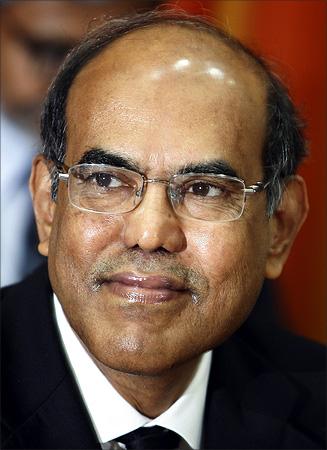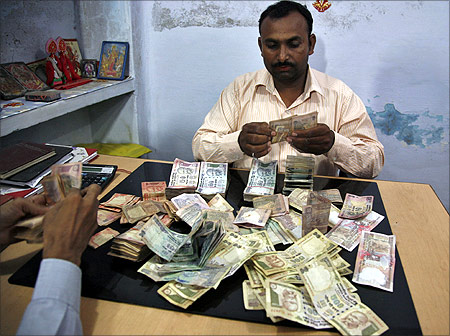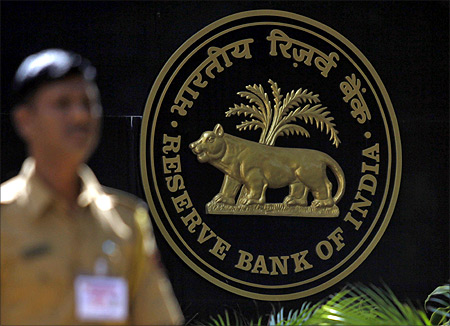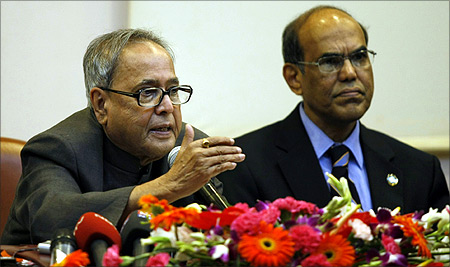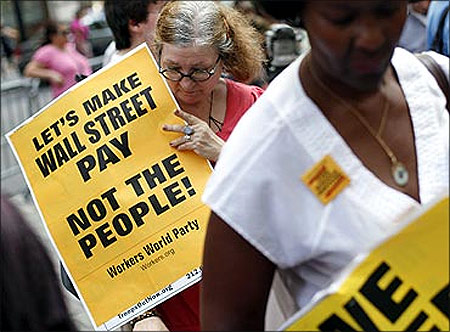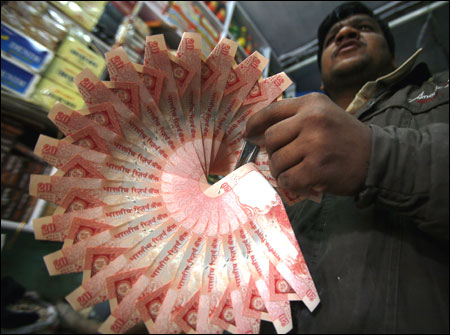 | « Back to article | Print this article |
RBI keeps key rates unchanged, pegs GDP at 6.9%
The Reserve bank of India has kept the repo rate and reverse repo rates unchanged in its mid-quarter review of monetary policy announced on Thursday.
The cash reserve ratio (CRR) of scheduled banks is unchanged at 4.75 per cent. The repo rate under the liquidity adjustment facility (LAF) unchanged at 8.5 per cent.
Consequently, the reverse repo rate under the LAF will remain unchanged at 7.5 per cent, and the marginal standing facility (MSF) rate and the Bank Rate at 9.5 per cent.
The Reserve Bank had reduced the CRR by 75 basis points from 5.5 per cent to 4.75 per cent effective March 10, 2012.
This measure was necessitated ahead of this scheduled Mid-Quarter Review to address the persistent structural liquidity deficit beyond the Reserve Bank's comfort level, which would have further worsened during the week of March 12-16 due to advance tax outflows.
The recent growth-inflation dynamics have prompted the Reserve Bank to indicate that no further tightening is required and that future actions will be towards lowering the rates.
However, notwithstanding the deceleration in growth, inflation risks remain, which will influence both the timing and magnitude of future rate actions.
Click NEXT to read more...
RBI keeps key rates unchanged, pegs GDP at 6.9%
Domestic economy
Growth
The GDP growth (y-o-y) decelerated to 6.1 per cent in Q3 of 2011-12 from 6.9 per cent in Q2 mainly reflecting a slowdown in industrial activity.
On the expenditure side, the growth moderation was mainly due to a deceleration in investment activity and weak external demand.
The Central Statistics Office (CSO) has estimated the full year growth for 2011-12 at 6.9 per cent, which is in line with the Reserve Bank's projection.
The growth in industrial production, as reflected in the index of industrial production (IIP), moderated to 4.0 per cent during 2011-12 (April-January) from 8.3 per cent in the corresponding period a year ago.
While growth in the capital goods and intermediate goods sectors was negative, growth in the basic goods and consumer goods sectors decelerated marginally. Given the significant volatility in IIP numbers, the Reserve Bank also uses several other indicators to assess the overall industrial activity.
The manufacturing PMI for February suggested that industrial activity remained in an expansionary mode. While corporate sales growth in Q3 of 2011-12 was robust, margins moderated, reflecting increasing difficulty in passing on rising input prices.
Click NEXT to read more...
RBI keeps key rates unchanged, pegs GDP at 6.9%
Inflation
After remaining above 9 per cent during April-November 2011, y-o-y headline wholesale price index (WPI) inflation rate moderated to 7.7 per cent in December and further to 6.6 per cent in January 2012, before rising to 7.0 per cent in February. While moderation in WPI inflation stemmed mainly from primary food articles, fuel and manufactured products groups also contributed.
Primary food articles inflation, which was modest at 0.8 per cent in December, turned negative (-0.5 per cent) in January 2012, before rising to 6.1 per cent in February. Despite the sharp increase in global crude oil prices, fuel group inflation moderated from 15.0 per cent in December to 12.8 per cent in February, reflecting the absence of commensurate pass-through to domestic consumers.
Non-food manufactured products inflation moderated from 7.9 per cent in December to 5.8 per cent in February 2012, reflecting both a slowdown in domestic demand following the monetary tightening and moderation in global non-oil commodity prices. The momentum indicator of non-food manufactured products inflation (seasonally adjusted 3-month moving average inflation rate) also showed a moderating trend.
Notably, Consumer Price Index (CPI) inflation (as measured by the new series, base year 2010) for the month of January 2012 was 7.7 per cent suggesting that price pressures persist at the retail level.
Click NEXT to read more...
RBI keeps key rates unchanged, pegs GDP at 6.9%
Fiscal Situation
The Centre's fiscal conditions deteriorated during 2011-12 (April-January) with key deficit indicators already crossing the budget estimates for the full year. Apart from sluggishness in tax revenues, Government's non-plan expenditure, particularly subsidies, increased sharply.
As indicated in the TQR, the slippage in the fiscal deficit has been adding to inflationary pressures. Credible fiscal consolidation, therefore, will be an important factor in shaping the inflation outlook.
Money, Credit and Liquidity Conditions
The y-o-y money supply (M3) growth and non-food credit growth moderated, reflecting the slowdown in the economy. Liquidity conditions have remained significantly in deficit mode.
In order to mitigate the liquidity tightness, the Reserve Bank undertook steps to inject primary liquidity of a more durable nature through open market operations (OMOs) aggregating Rs 1,247 billion during November 2011- March 9, 2012 and reduced the CRR by 125 basis points (50 basis points effective January 28 and 75 basis points effective March 10), injecting primary liquidity of about Rs 800 billion.
The liquidity situation has since improved and it is expected to ease further in the weeks ahead.
Click NEXT to read more...
RBI keeps key rates unchanged, pegs GDP at 6.9%
Global Economy
Since the Reserve Bank's Third Quarter Review (TQR) of January 24, 2012, there has been modest improvement in the global macroeconomic situation.
The recent macroeconomic data for the US economy show some positive signs. In particular, labour market conditions have improved.
However, the US Fed expects that economic conditions warrant exceptionally low levels for the federal funds rate at least through late 2014.
The immediate financial market pressures in the euro area have been alleviated to some extent by the European Central Bank (ECB) injecting liquidity of more than one trillion euro through the two long-term refinancing operations.
Growth in the euro area, however, turned negative in Q4. The emerging and developing economies (EDEs) are showing signs of growth slowdown. As a result, the global growth for 2012 and 2013 is expected to be lower than earlier anticipated.
Inflation pressures in both advanced economies and EDEs moderated towards the end of 2011 on account of subdued domestic demand and correction in non-fuel commodity prices.
Global crude prices, however, have spiked suddenly reflecting both geo-political concerns and abundant global liquidity, accentuating the risks to growth and inflation.
Click NEXT to read more...
Union Budget 2012-13: Complete coverageRBI keeps key rates unchanged, pegs GDP at 6.9%
External sector
While merchandise exports growth decelerated, moderation in imports growth was less pronounced leading to a widening of the trade deficit.
After the TQR, the rupee has moved in a range of Rs 48.69 to Rs 50.58 per USD. With sluggish demand conditions in the advanced economies impeding exports growth and crude oil prices rising sharply, the current account deficit (CAD) is likely to remain high.
The financing of the CAD will continue to pose a challenge so long as the global situation remains uncertain.
Outlook
While the recovery in the US has been progressing, economic activity in the euro area has contracted. Although abundant liquidity injection by the ECB has mitigated the immediate pressures in financial markets, a credible solution to the sovereign debt problem is yet to emerge.
Sluggish global economic activity, uncertainty in the euro area and rising crude oil prices will hamper growth prospects of EDEs.
On the domestic front, while most indicators suggest that the economy is slowing down, the performance in Q4 of 2011-12 is expected to be better than that in Q3. Inflation has broadly evolved along the projected trajectory so far.
However, upside risks to inflation have increased from the recent surge in crude oil prices, fiscal slippage and rupee depreciation. Besides, there continues to be significant suppressed inflation in fuel, fertilizer and power as administered prices do not fully reflect the costs of production.
